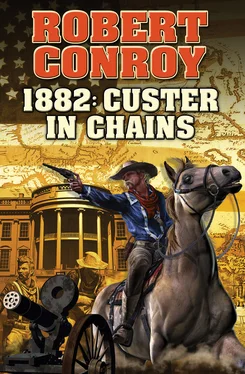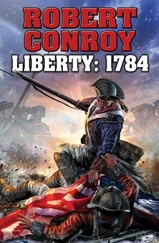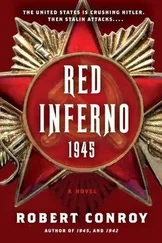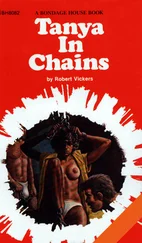Robert Conroy - 1882 - Custer in Chains
Здесь есть возможность читать онлайн «Robert Conroy - 1882 - Custer in Chains» весь текст электронной книги совершенно бесплатно (целиком полную версию без сокращений). В некоторых случаях можно слушать аудио, скачать через торрент в формате fb2 и присутствует краткое содержание. Год выпуска: 2015, Издательство: Baen, Жанр: Альтернативная история, на английском языке. Описание произведения, (предисловие) а так же отзывы посетителей доступны на портале библиотеки ЛибКат.
- Название:1882: Custer in Chains
- Автор:
- Издательство:Baen
- Жанр:
- Год:2015
- ISBN:нет данных
- Рейтинг книги:3 / 5. Голосов: 1
-
Избранное:Добавить в избранное
- Отзывы:
-
Ваша оценка:
- 60
- 1
- 2
- 3
- 4
- 5
1882: Custer in Chains: краткое содержание, описание и аннотация
Предлагаем к чтению аннотацию, описание, краткое содержание или предисловие (зависит от того, что написал сам автор книги «1882: Custer in Chains»). Если вы не нашли необходимую информацию о книге — напишите в комментариях, мы постараемся отыскать её.
1882: Custer in Chains — читать онлайн бесплатно полную книгу (весь текст) целиком
Ниже представлен текст книги, разбитый по страницам. Система сохранения места последней прочитанной страницы, позволяет с удобством читать онлайн бесплатно книгу «1882: Custer in Chains», без необходимости каждый раз заново искать на чём Вы остановились. Поставьте закладку, и сможете в любой момент перейти на страницу, на которой закончили чтение.
Интервал:
Закладка:
Custer growled something and Lincoln continued. “Sir, it is highly unlikely that we will get that many volunteers, maybe half that number. Then, we will have to supply and support those troops in Cuba and we simply do not have the resources to do that.”
Custer glared at him. “Then we will make do with what we can.”
Lincoln was shocked. “Surely you’re not suggesting that one American is worth ten Spaniards or anything like that.”
“Of course not,” Custer said angrily. “I learned that on the Little Big Horn. But I will say that one American volunteer is worth more than one poorly trained, poorly armed and poorly led Spanish conscript.”
William H. Hunt, the fifty-eight year old Secretary of the Navy decided it was his turn to comment.
“Mr. President, as I have been trying to inform you since your inauguration, the navy is in even worse shape than the army. The mighty fleet of ironclads and other ships we had during the Civil War has either been scrapped or the ships are little more than barely floating piles of rust. Worse, those few that remain afloat are obsolete. Naval technology is increasing at a rapid rate while we have been either standing still or moving backwards. We have a number of ships, but they are all either small, old, obsolete, or all of the preceding. In fact, many of our so-called warships are wooden sloops and schooners that were inadequate before the Civil War commenced. Simply put, we have no ships capable of defending the troop ships and supply ships that we might send to Cuba.”
“Damn it to hell,” Custer muttered.
Hunt continued, undeterred by the comment. “Spain, on the other hand, has a handful of what are now being categorized as battleships and cruisers. Their navy might be laughably small when compared with Great Britain’s or even France’s, but it could easily overwhelm ours.”
Custer glared at him. “Then we will build a navy, just as we are building an army.”
Hunt glared back, “And that is much easier said than done, sir. Starting from scratch, it will take possibly two years to build a good-sized warship of, say, eight thousand tons, and another year to get her crew trained. And obviously, we must have a number of these to fight Spain. We have the ability to create a fleet, just not the time.”
Robert Lincoln laughed harshly. “If we’re not careful, Spain and the United States will be likened to two chained dogs who cannot quite reach each other because of the lengths of their chains. Instead, they just sit there barking and growling at each other in impotent fury. Instead of this war serving to create an American empire, or fully reunite the North and South, or even freeing the slaves in Cuba, we could become the laughingstock of the world.”
Custer stood and began to pace. Uniting the North and South was a secondary consideration and freeing Spain’s slaves was not even on his agenda. He wanted the glory that would come from being victorious over Spain. He wanted to take that giant step in creating an American empire. He wanted to cement his place in history as a great president.
“That cannot happen,” he snapped. “We must get our men to Cuba. My goal is to have an army at the gates of Havana within a month. I think we can hire or commandeer enough civilian transports to send a good-sized army to Cuba before the Spanish fleet can gather in strength.”
“I do have a few suggestions,” said Hunt.
“Let’s hear them,” snarled Custer.
“First, regardless of what other steps we might decide, we must begin building proper and modern warships, even though it will take time and money.”
“Agreed,” said Custer.
“Second, we must arm merchant ships, just like we did during the Civil War. These ships must be listed as regular navy ships and not privateers which are, of course, illegal according to international treaty. While these ships would not be able to take on large regular warships, they should be able to blockade Cuba and Puerto as well as interdicting Spanish commerce. They should also be able to defend themselves against smaller Spanish warships.”
Custer rubbed his hands together. “Excellent.”
Hunt smiled, “And finally, sir. If we cannot build a navy, may I suggest that we rent one?” * * *
Brevet Colonel Martin Ryder arrived unannounced at the encampment of the First Maryland Volunteers. An astonished sentry did nothing more than salute him and let him pass.
It was before reveille and no one was stirring, at least not anyone he could see. He noted approvingly that the camp was well laid out and well kept. The tents were all in straight lines. There was no trash or debris in sight. And there was no stench from improperly dug latrines. He quickly found the commander’s tent and entered. Inside were an old folding cot and a desk. Even though he was tired, the cot did not look inviting. What the hell, he thought, he’d slept on the ground often enough. He’d get used to the cot. He decided he’d been corrupted by sleeping in a real bed for the last few months at West Pointe.
He lit the oil lamp and began reading some of the correspondence on Colonel Fowler’s desk. Most of it was old, so he assumed that other officers were taking care of pressing matters.
There was a knock and a clearly flustered young major entered and saluted. “Sir, I’m Major Jack Barnes and I apologize for not being here to greet you.”
Ryder stood, returned the salute and shook the major’s hand. “Don’t worry about it, major. If I’d wanted a ceremony I would have told you in advance that I was coming. I assume that sentry did his duty and reported upwards.”
“He did sir. Now, what can I do to assist you?”
“First, major, you can get us some coffee and then you can sit down and we can talk.”
Mugs of coffee arrived almost as quickly as they had at General Sheridan’s office. It was hot, dark, and thick. “Excellent,” Ryder said after a swallow. “Now, after reveille I want all officers assembled. I’m sure they’ve got some concerns and questions and I’m going to answer them to the best of my ability. To set yours and everyone else’s mind at rest, I have no plans to change command assignments or demote anyone. Everyone will stay as is until proven incompetent or we need them elsewhere. And that includes you, major; even though I’ve noticed that your military experience is somewhat less than negligible. Has Sergeant-Major Haney arrived yet?”
“He came yesterday and informed us that you were on the way. He just didn’t know the details as to when.”
“Good. Now let me be blunt. Haney knows more about the army than all of you in the regiment put together. I strongly, strongly, urge you to take solemn heed of anything he suggests. He may not be an officer, but, trust me, I will back him fully.”
Barnes grinned. “I already came to that conclusion.”
Bugles sounded and men stirred. Word that their new commanding officer had arrived was spreading quickly.
“Barnes, we are going to train hard and fast. This regiment is going to Cuba a lot sooner than anticipated. We might have only a month before we depart.”
“Jesus. Can we be ready in that short a time?”
“I don’t think we have a choice.”
* * *
James Kendrick presented himself to the White House usher and was told to wait in the first floor Green Room. A few moments later, Libbie Custer arrived. She was dressed in a blue silk gown and smiled radiantly. The dress was cut to show her shoulders and a significant amount of her exquisite bosom. Kendrick could easily see how the very lovely Mrs. Custer could melt anyone. What really struck him was the wit and intelligence behind her eyes. She would be a helluva woman to conquer; he thought and then wondered just how her husband had managed that task. Perhaps there was more to the president then he thought. Or maybe she had conquered him. After all, it was widely rumored that she was the power behind the throne. Women could neither vote nor hold office, but Libbie Custer was clearly in charge of the President of the United States.
Читать дальшеИнтервал:
Закладка:
Похожие книги на «1882: Custer in Chains»
Представляем Вашему вниманию похожие книги на «1882: Custer in Chains» списком для выбора. Мы отобрали схожую по названию и смыслу литературу в надежде предоставить читателям больше вариантов отыскать новые, интересные, ещё непрочитанные произведения.
Обсуждение, отзывы о книге «1882: Custer in Chains» и просто собственные мнения читателей. Оставьте ваши комментарии, напишите, что Вы думаете о произведении, его смысле или главных героях. Укажите что конкретно понравилось, а что нет, и почему Вы так считаете.












